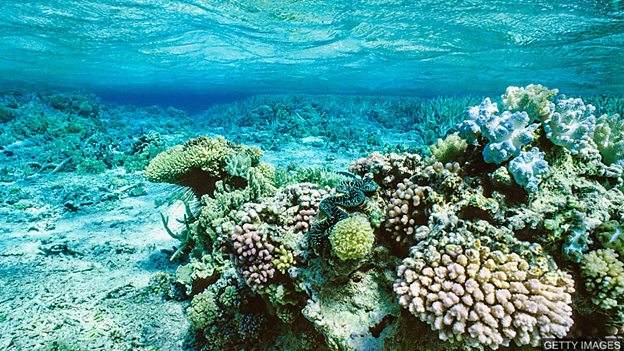媒體英語
Great Barrier Reef has lost half of its corals since 1995 過去25年中大堡礁珊瑚數量下降超50%

一項研究發現,自 1995 年以來,由于氣候變化導致海水變暖,澳大利亞大堡礁珊瑚數量下降了一半以上。
There is no time to lose. That’s the stark warning from Australian researchers about the health of the world’s largest reef system.
情況緊迫,時不我待。這是澳大利亞研究人員對世界上最大的珊瑚礁系統健康狀況發出的嚴厲警告。
They say its coral has been under a sustained attack by warmer seas driven by climate change. This causes bleaching.
研究人員們說,由于氣候變化導致的海水升溫,大堡礁的珊瑚受到了持續攻擊。這會導致珊瑚白化。
Under stress, the corals expel symbiotic algae which lives in their tissues and gives them their colour and energy.
面對環境壓力,珊瑚會排出生活在其細胞組織中,并為其提供顏色和能量的共生藻。
The study asserts that this is compromising the Great Barrier Reef’s ability to recover.
這項研究堅稱,這損害了大堡礁的恢復能力。
詞匯表
stark warning 嚴厲警告
reef 礁
coral 珊瑚
sustained 持續的
bleaching 顏色淡化,白化
expel 排出
symbiotic 共生的,共同棲息的
algae 藻類,海藻
tissues (動植物的細胞)組織
compromising 損害,傷害
閱讀理解:請在讀完上文后,回答下列問題。
1. True or false? Climate change has played a role in the loss of the corals.
2. What did the Australian researchers warn of?
3. What happens to the corals when they are under stress?
4. Where in the corals does symbiotic algae live?
答案
1. True or false? Climate change has played a role in the loss of the corals.
True. The warmer seas driven by climate change attacked the corals continuously, which causes bleaching.
2. What did the Australian researchers warn of?
The Australian researchers warned of the health of the world’s largest reef system – the Great Barrier Reef.
3. What happens to the corals when they are under stress?
When the corals are under stress, they expel symbiotic algae.
4. Where in the corals does symbiotic algae live?
It lives in the corals’ tissues.



